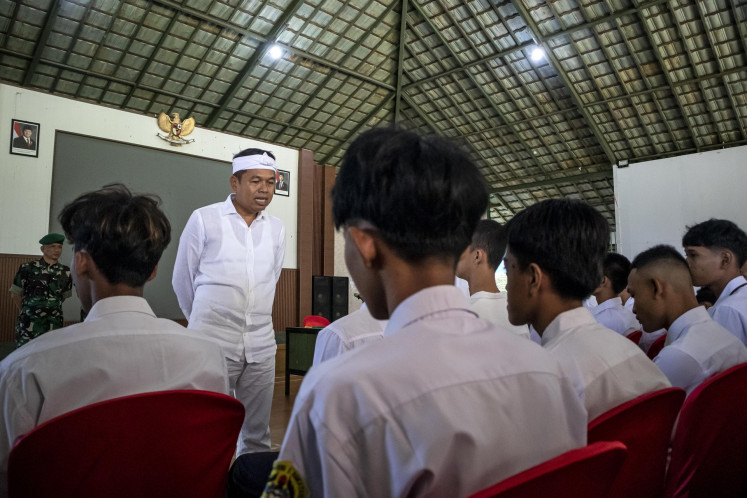Popular Reads
Top Results
Can't find what you're looking for?
View all search resultsPopular Reads
Top Results
Can't find what you're looking for?
View all search results'Dangdut' and hyper sexualization
After the reform era when state control became more relaxed, female sexuality in dangdut increasingly became a major force in its music scene.
Change text size
Gift Premium Articles
to Anyone
 The sexualization of female dangdut singers proved successful, with many female singers rising through the ranks with their songs becoming instant hits. (Shutterstock/-)
The sexualization of female dangdut singers proved successful, with many female singers rising through the ranks with their songs becoming instant hits. (Shutterstock/-)
L
ast week, Irmawati, whose stage name was Irma Bule, passed away after being bitten by a venomous cobra. Originally from a poor village in Kerawang, West Java, Irma did not intend to be a famous dangdut singer.
As a mother of three, well-known for her goyang ular (snake dance moves), she was a sad portrait of a poor woman struggling to sustain her life and her family by performing provocative dance moves with a serpent.
As Time reported, a singer like Irma only got paid around US$20 per performance without a snake and $25 with one.
Although she was used to bringing a snake onto the stage, in her last performance she accidentally stepped on its tail and it bit her.
However, the blonde-haired singer managed to finish her performance before she finally collapsed and died. Some argue that bringing a snake onto the stage was a way for her to avoid unwanted touches from men and others say her persistence was all because she did not want to lose her fees.
Dangdut, writes the scholar Andrew N. Weintraub of the University of Pittsburgh, is of the rakyat, the people. With lyrics representing everyday life of ordinary Indonesians, often associated with the kampungan (underclass),dangdut, influenced among others by Indian pop music, has become a popular genre, not only used in political campaigns but also as a popular commodity that produces “fetishization” of female singers’ sensuality and sexuality.
In the 1980s, being hailed as the Raja Dangdut (Dangdut King), Rhoma Irama used this genre to preach and spread Islamic moral values through his songs. His popularity garnered national and international attention.
Some female dangdut singers were also popular during the New Order era, including Elvy Sukaesih, Itje Trisnawati and Ikke Nurjanah. Although they brought up sexuality issues in their song lyrics, the discourse largely followed social views in which sexuality is legitimate only in marriage.
For example, Elvy Sukaesih’s song entitled “Birahi” (Lust) warned that lust is dangerous, hence should be avoided unless we are already officially married.
Similar tones also can be found in Camelia Malik’s “Nikmat Cinta” (Pleasure of Love) and Itje Trisnawati’s “Satu Malam” (One Night). Both songs associated sexuality with moral and religious values.
While Camelia’s song expected her love will be united in faith, Itje sang about the expectations of a wife concerning her husband’s “moral duty” for sexual intercourse — nafkah batin (spiritual providence), which according to certain religious interpretations is deemed a husband’s moral duty.
After the reform era when state control became more relaxed, female sexuality in dangdut increasingly became a major force in its music scene.
The appearance of Inul Darastista with her goyang ngebor (drilling moves) attracted national and international fame and also protests from conservative Islamic groups.
Debates surrounding freedom to express female sexuality also emerged from her “drilling” phenomenon. Some argued Inul’s dancing expressed a woman’s autonomy over her body, while others conflated Inul’s dance moves with immorality and indecency.
Nevertheless, several female dangdut singers followed Inul’s success by inventing their own provocative sensual signature moves and lyrics. Singer and actress Julia Perez blatantly used sensual delivery and metaphors to represent sexual acts in her songs “Belah Duren” (Splitting the Durian) and “Jupe Suka 69” (Jupe Likes 69).
The sexualization of female dangdut singers proved successful, with many female singers rising through the ranks with their songs becoming instant hits. Zaskia Gotik is popular with her goyang itik (duckling dance) and Duo Serigala are famous for their goyang dribble (dribble dance).
It may seem these singers’ sexuality represent their sexual autonomy. In the Hollywood scene, Nicki Minaj, Kim Kardashian and Miley Cyrus perpetuated the emergence of a “sex-positive” movement in the popular culture, asserting female sexuality.
Apparently, as Nancy Jo Sales wrote in her latest book this year, American Girls, this term is often associated with “free and feminist”. However, today’s “hyper sexualization” of popular culture has also taken its toll on young girls.
Sexual liberation is a double-edged sword. Based on her two-and-a-half years reporting and interviewing girls between the ages of 13 and 19, Sales wrote that the hyper sexualized culture, inundated with sexual images of girls and women, has significantly influenced girls’ self-worth and identity.
Extreme behaviors are rampant, she reported, in the exchange of nude pictures, “slut-shaming” and “competition among girls” to be pretty and sexy following perceived media standards.
In the hype of social media culture, empowerment and liberation is defined as simple as posting sexy pictures on Instagram.
What happens in our dangdut music scene is not so much different from Sales’ findings.
The hyper sexualization of female singers leads to fierce competition among the female singers to come up with something more “provocative” than their rivals.
On the other hand, the pressures faced by men to be sexually provocative are not as strong as that faced by women. Irma Bule and her snake are an example of the dark sides of hyper sexualization of the singers.
Poverty drove and forced her to invent something provocative and different. Irma’s tragedy raised the questions: Are these female singers really exercising their autonomy through sexual expression? Is this the kind of sexual liberation that we aim for?
***
The author, who obtained a Master’s degree in public policy from the National University of Singapore, is the writer of Coming Out and a lecturer of gender and sexuality studies.
---------------
We are looking for information, opinions, and in-depth analysis from experts or scholars in a variety of fields. We choose articles based on facts or opinions about general news, as well as quality analysis and commentary about Indonesia or international events. Send your piece to community@jakpost.com.









